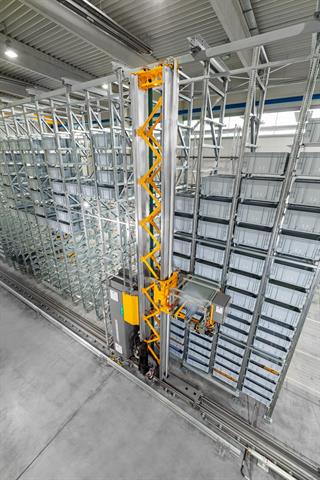 Miniload STC 2B1A |
Shortly after the world premiere of the STC 2B1A, Jungheinrich received the first order for its new stacker crane for automated miniload warehouses.
The VAHLE Group, a manufacturer of energy and data communication systems from Kamen, commissioned the Hamburg-based specialist in logistics solutions for the construction of an automated small parts warehouse. The order includes conventional warehouse technology as well as forklifts.
The core element of the system is the new STC 2B1A stacker crane. The Miniload will serve a total of 7,314 rack storage locations in Kamen at a travel speed of 6 m/s. In the small parts warehouse, two different container formats are used simultaneously - boxes measuring 600 x 400 mm, which are stored double-deep, and boxes measuring 300 x 400 mm, which are stored four-deep and crosswise.
Rüdiger Kuhn, head of purchasing and materials management at VAHLE, explains: "The VAHLE Group always focuses on quality - quality of our products and services, our employees, training and building equipment. Our commitment to continuous improvement is also reflected in the new automated small parts warehouse that Jungheinrich is building for us in Kamen. We were impressed by the innovative power of the new stacker crane combined with Jungheinrich's ability to provide extensive problem-solving expertise in the field of logistics systems from a single source. We will therefore work with Jungheinrich on this project to implement a wide aisle warehouse, cantilever racking for longitudinal goods and drive-through shelving for packages in addition to the small parts warehouse."
Jungheinrich's STC 2B1A has energy buffers that store energy released during braking processes and feed it back into the drive system during acceleration. This reduces the energy requirements and, in particular, the required connected load of the stacker crane by up to 25% compared to the competition.
Jungheinrich has also designed the STC 2B1A for maximum efficiency in terms of space utilisation.
Completion of the plant is scheduled for the end of 2018.